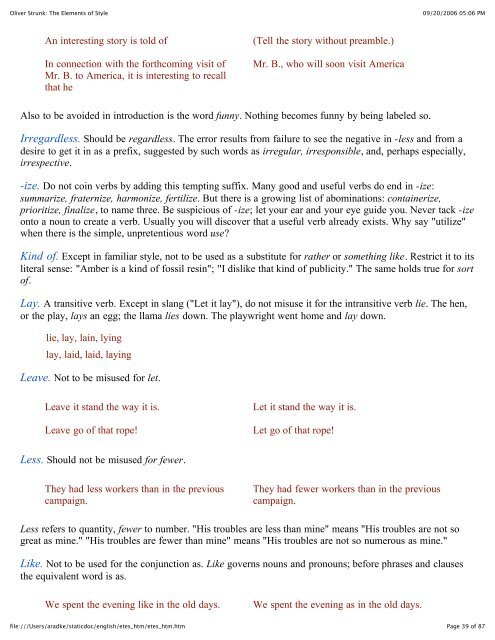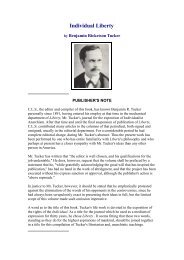Oliver Strunk: The Elements of Style - Evernote
Oliver Strunk: The Elements of Style - Evernote
Oliver Strunk: The Elements of Style - Evernote
You also want an ePaper? Increase the reach of your titles
YUMPU automatically turns print PDFs into web optimized ePapers that Google loves.
<strong>Oliver</strong> <strong>Strunk</strong>: <strong>The</strong> <strong>Elements</strong> <strong>of</strong> <strong>Style</strong><br />
An interesting story is told <strong>of</strong> (Tell the story without preamble.)<br />
In connection with the forthcoming visit <strong>of</strong><br />
Mr. B. to America, it is interesting to recall<br />
that he<br />
file:///Users/aradke/staticdoc/english/etes_htm/etes_htm.htm<br />
Mr. B., who will soon visit America<br />
Also to be avoided in introduction is the word funny. Nothing becomes funny by being labeled so.<br />
09/20/2006 05:06 PM<br />
Irregardless. Should be regardless. <strong>The</strong> error results from failure to see the negative in -less and from a<br />
desire to get it in as a prefix, suggested by such words as irregular, irresponsible, and, perhaps especially,<br />
irrespective.<br />
-ize. Do not coin verbs by adding this tempting suffix. Many good and useful verbs do end in -ize:<br />
summarize, fraternize, harmonize, fertilize. But there is a growing list <strong>of</strong> abominations: containerize,<br />
prioritize, finalize, to name three. Be suspicious <strong>of</strong> -ize; let your ear and your eye guide you. Never tack -ize<br />
onto a noun to create a verb. Usually you will discover that a useful verb already exists. Why say "utilize"<br />
when there is the simple, unpretentious word use?<br />
Kind <strong>of</strong>. Except in familiar style, not to be used as a substitute for rather or something like. Restrict it to its<br />
literal sense: "Amber is a kind <strong>of</strong> fossil resin"; "I dislike that kind <strong>of</strong> publicity." <strong>The</strong> same holds true for sort<br />
<strong>of</strong>.<br />
Lay. A transitive verb. Except in slang ("Let it lay"), do not misuse it for the intransitive verb lie. <strong>The</strong> hen,<br />
or the play, lays an egg; the llama lies down. <strong>The</strong> playwright went home and lay down.<br />
lie, lay, lain, lying<br />
lay, laid, laid, laying<br />
Leave. Not to be misused for let.<br />
Leave it stand the way it is. Let it stand the way it is.<br />
Leave go <strong>of</strong> that rope! Let go <strong>of</strong> that rope!<br />
Less. Should not be misused for fewer.<br />
<strong>The</strong>y had less workers than in the previous<br />
campaign.<br />
<strong>The</strong>y had fewer workers than in the previous<br />
campaign.<br />
Less refers to quantity, fewer to number. "His troubles are less than mine" means "His troubles are not so<br />
great as mine." "His troubles are fewer than mine" means "His troubles are not so numerous as mine."<br />
Like. Not to be used for the conjunction as. Like governs nouns and pronouns; before phrases and clauses<br />
the equivalent word is as.<br />
We spent the evening like in the old days. We spent the evening as in the old days.<br />
Page 39 <strong>of</strong> 87

















